Good morning. The first evidence session in a massive public inquiry into the UK’s handling of the Covid pandemic starts today. Lady Hallett, a retired judge and crossbench peer in the House of Lords, who also led the inquests into the 7/7 bombings, is the chair.
The scope of the investigation is staggering: it looks at every part of the pandemic, from the government’s preparedness, to political decisions that were made, and the impact on the health service and vaccine rollouts.
This inquiry is different from others that we have seen in the past because of the scale of the pandemic. It affected everyone and as a result everyone has questions. To date, over 220,000 people have died from Covid in the UK and an estimated 2 million more self-reported experiencing long Covid. That does not include the untold damage to young people whose life prospects may have been irreparably damaged, or the impact on the nation’s mental health and the sizeable economic damage.
In addition to learning lessons to better handle future pandemics, Hallett views this inquiry as a space to “commemorate the hardship and loss that so many people in the UK suffered”.
For today’s newsletter, I spoke to Guardian social affairs correspondent Robert Booth about what we can expect in the coming months from the Covid inquiry. That’s right after the headlines.
Five big stories
-
Health | A woman has been sentenced to 28 months in prison after pleading guilty to procuring drugs to induce an abortion after the legal limit. The mother of three, 44, received the medication under the “pills by post” scheme, which was introduced during the Covid pandemic.
-
Italy | The former Italian prime minister Silvio Berlusconi has died aged 86. The media tycoon, who led three governments between 1994 and 2011, had been diagnosed with leukaemia some time ago.
-
Politics | Sources have told the Guardian that Rishi Sunak would block Boris Johnson from standing again as a Conservative MP before the next election. The prime minister clashed publicly with Johnson over his failed attempts to elevate several close allies to the House of Lords.
-
Scotland | The first minister, Humza Yousaf, has rejected growing calls from across the political spectrum to suspend Nicola Sturgeon from the Scottish National party after her arrest on Sunday. The former first minister has said she is innocent of any wrongdoing.
-
Economy | Britain has experienced the worst exports record of any member of the G7 besides Japan over the last decade, according to a new analysis that will raise pressure on the government to reconsider its post-Brexit trade deal with the EU.
In depth: ‘Clearly, things went wrong – there’s an obligation to make sure we improve our responses’
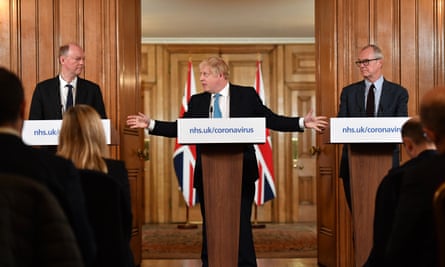
Before it even began, the Covid inquiry was faced with significant obstacles. The government is spending hundreds of thousands of pounds on legal action to block the inquiry from examining Boris Johnson’s unredacted WhatsApp messages and contemporaneous notebooks. Ministers argue that 55,000 documents have already been handed over – and anything that hadn’t been was irrelevant. But Hallett has stood fast in her demands, saying that it was for her to determine the relevancy of all potential evidence. This obfuscation has been decried as an attempt to cover up mismanagement. And that is all before the inquiry has begun hearing evidence.
Why is this inquiry so important?
With no deadline to hit, the inquiry is expected to last at least until 2026. At least £85m has already been spent, and it is expected to cost well over £100m over the next three years. Hallett may call up to 1,000 witnesses to give evidence in that time, likely including at least three prime ministers, numerous cabinet ministers and senior civil servants.
The reason for the exhaustive exercise? The UK has one of the highest Covid death tolls in the world. The cost of making similar mistakes in the future is simply too high – experts say that another pandemic is inevitable, potentially in the next decade. It is of upmost importance that “the lessons are learned for next time”, Robert says. “Clearly, things went wrong in our response to Covid, we could see that happening in real time, so there’s an obligation to make sure we improve our government and health system responses.”
There has also been a big push from the bereaved – particularly the Covid-19 Bereaved Families for Justice group, which represents more than 6,000 families – who desperately want the public inquiry to examine what really happened to their loved ones. “Even though it’s not taking the role of an inquest, it will provide answers for those who witnessed first-hand how things were going wrong, especially in the most acute circumstances,” Robert says.
The main themes
The inquiry is being split up into six “modules” but only the first four have been opened: resilience and preparedness, decision-making by the government, the impact of Covid on the health system, and vaccines.
This first leg will probably include the role of austerity in reducing capacity in the health service to respond effectively and safely to a pandemic. In the autumn the political drama will accelerate. “The second module is probably going to be the most box office moment politically,” says Robert. “That’s going to take apart the government’s decision making. What happened inside Downing Street? How was the government working? How were they responding to the science? How were they responding to public opinion?”
This is likely going to be the most scarring part of the inquiry for politicians, particularly for Rishi Sunak as he has the most to lose and was a crucial part of the government as chancellor. Seeing as Boris Johnson has already set his political career alight and has another Covid-related inquiry hampering him, he has a lot less to lose, and plenty of opportunity to hamper his successor with his evidence. However, if the findings are bad enough they could burn any future chance of a Johnson return to Downing Street.
And all of that only takes us to the end of this year. Hallett then has the small task of covering the entire healthcare system, the scandal around procurement, the crisis in care homes, test and trace, the impact on education and children, the role of the Treasury in supporting the economy, and how the welfare system supported the most vulnerable. She has also emphasised the need to frame all of this evidence-gathering through the lens of social and economic inequality because we know that Covid affected different sections of society in different ways. “I mean, there’s just an incredible amount to get through,” Robert says.
The victims
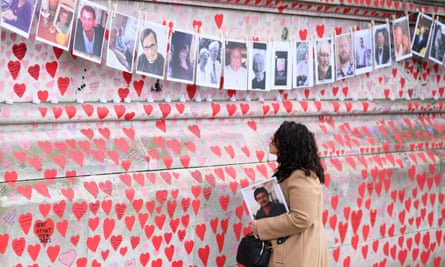
Bereaved people will have the chance to take part in the inquiry through something called a listening exercise, essentially an online form that people who have lost loved ones in the pandemic can fill in to give their view on the testimony that is being given during the inquiry.
But for many, this is not enough. “They want to be giving evidence in the witness box themselves; they want to be far more central,” Robert says. Unfortunately, there are simply too many people who have been affected by the pandemic for this to be possible: “This isn’t like the Grenfell inquiry or Hillsborough where you have a limited number of bereaved advocates. Over 220,000 people died of Covid in the UK – it’s not possible to represent all of those people in an inquiry like this,” Robert says.
This need for representation has created tension between the inquiry and the bereaved families groups. For some more insight into the thoughts and feelings of those who lost loved ones during the pandemic, read Robert’s brilliant interview with four bereaved people who recall the haphazardness of the response and share why they think Britain was so unprepared.
What to expect next
The public will not have to wait three years for answers from this inquiry – Hallett has decided to produce reports as she goes along. “We expect the first report on modules one and two next year, which is quite quick,” says Robert. “And that’s really important for the UK because the clock is ticking on the next pandemic and knowing what we did wrong should shape what we do right now.”
This constant output will mean that the inquiry will remain at the forefront of the political agenda, especially as we head towards a general election in the next 18 months.
Beyond political intrigue, what can the inquiry hope to achieve? The bereaved cannot have their loved ones returned to them, young people cannot replace lost years and those with long Covid will not be cured. But transparency and accountability can go a long way in helping the nation to heal from the pandemic years. What that could look like is, as of yet, unknown, says Robert: “What is clear though is that it’s going to be the big saga of the next few years.”
Yesterday’s newsletter incorrectly named Nigel Evans as the Conservative MP who stood down as an MP on Saturday and triggered a byelection; that should have referred to Nigel Adams, MP for Selby and Ainsty.
after newsletter promotion
What else we’ve been reading

-
From the anodyne (12 boxes of used wine corks) to the downright creepy (a human skull), Guardian readers share the stories of their most astonishing attic discoveries. Craille Maguire Gillies, production editor, newsletters
-
Paolo Gerbaudo takes a look at Silvio Berlusconi’s legacy: “The years that followed Berlusconi’s exit from office vindicated his political style, which combined extreme personality politics, a skilful use of visual media and an unashamed demagogy – all to tap into voters’ disillusionment and cynicism about the status quo.” Nimo
-
ICMYI: Who needs journalists when you have actors playing journalists? Variety’s very chummy Actors on Actors series is back, with pairings that include former co-stars Claire Danes and Kieran Culkin taking a trip down memory lane, and Jennifer Coolidge dishing to The Bear’s Jeremy Allen White. Craille
-
Mat Youkee’s dispatch from Bogotá tracks the remarkable story of the indigenous siblings who managed to survive in Colombia’s perilous jungle for 40 days. Nimo
Sport

Cricket | Thursday sees the first Test of the 73rd Ashes series between Australia and England begin at Edgbaston, Birmingham. But who are the players to watch? Find out in our sport team’s authoritative player-by-player guide to the series, and sign up here for our free cricket newsletter, The Spin, for more coverage.
Football | Pep Guardiola is “firmly minded” to leave Manchester City when his current contract expires in two seasons, the Guardian reports. After winning the treble this season and unprecedented success at Barcelona and Bayern Munich, it’s thought Guardiola could choose to coach an Italian side or international squad.
Football | Kylian Mbappé has stunned Paris Saint-Germain by presenting a formal letter to the club informing them of his decision not to take up the option of a one-year contract extension next summer. If Mbappé does not reconsider, the striker’s contract will expire in June 2024, when the 24-year-old would be able to leave PSG on a free transfer.
The front pages
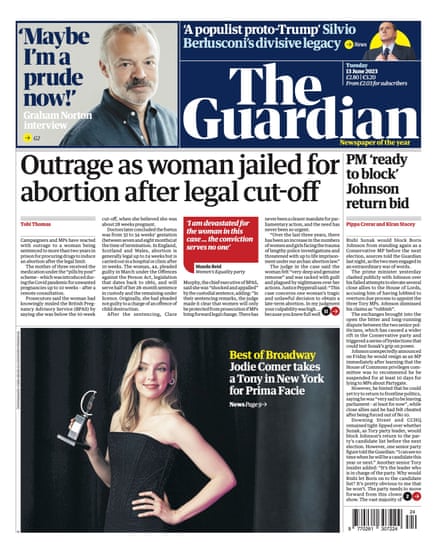
“Outrage as woman jailed for abortion after legal cut-off” says our Guardian splash headline this morning. The Daily Mirror has a curtain-raiser for the Covid inquiry, with “They deserve better”, saying that “As our PM and ex-PM bicker like toddlers”, grieving families are waiting to find out the truth of how No 10 handled the pandemic. It’s “All-out war” says the Metro as “Rishi and Boris trade vicious blows”. “Ex-PM was not told he had obeyed Covid rules” – Boris Johnson’s party defence is slapped down in the Times. “Boris: Believe me… I shall return to frontline politics” – that’s his “pledge” to Daily Express readers, says that paper. The Daily Mail would like us to ponder what it calls “A vision of Keir’s Britain” – channel crossings and Just Stop Oil protests. It says Labour has blocked greater police powers over protests and a crackdown on small boat arrivals. The i has an interesting one: “The Russian ‘agent’ living in UK with his family … thanks to Homes for Ukraine”. “Hunt: I’ll put us on path to lower tax” – that’s the Daily Telegraph. And lastly, the Financial Times: “MPs to grill City watchdog over Odey investigation”.
Today in Focus
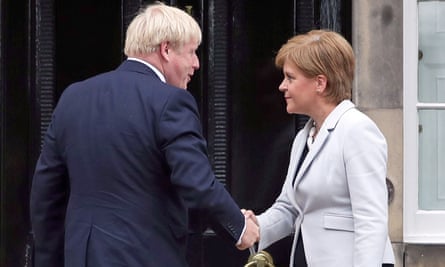
The long shadows of Boris Johnson and Nicola Sturgeon
The former PM and ex-Scottish first minister were controversial leaders. Now they are both facing disgrace – adding to the turmoil in British politics
Cartoon of the day | Sarah Akinterinwa
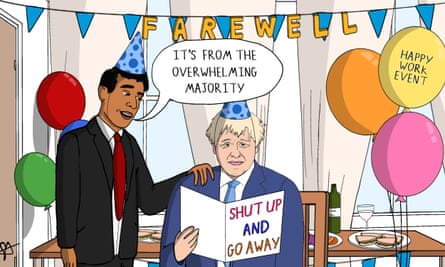
The Upside
A bit of good news to remind you that the world’s not all bad
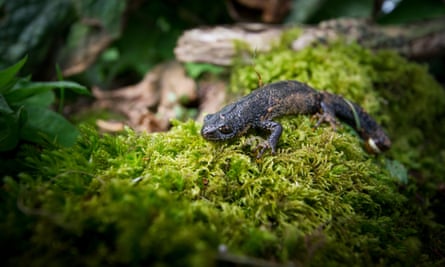
Proof that you can teach an old dog newt tricks: Freya the springer spaniel has been primed to sniff out at-risk amphibians from up to two metres away. Along with her colleagues, Nicola Jayne Glover – an ecology PhD student at the University of Salford in the UK – trained her dog to identify elusive great crested newts (the species is protected by law, and anyone found guilty of disturbing their resting or breeding sites, or of taking their eggs, can face up to six months in prison).
So successful was the trial with Freya, that Glover has now also trained her other dog, a springer-cocker spaniel named Newky, to do the same.
Sign up here for a weekly roundup of The Upside, sent to you every Sunday
Bored at work?
And finally, the Guardian’s puzzles are here to keep you entertained throughout the day – with plenty more on the Guardian’s Puzzles app for iOS and Android. Until tomorrow.
Stay connected with us on social media platform for instant update click here to join our Twitter, & Facebook
We are now on Telegram. Click here to join our channel (@TechiUpdate) and stay updated with the latest Technology headlines.
For all the latest Covid-19 News Click Here
